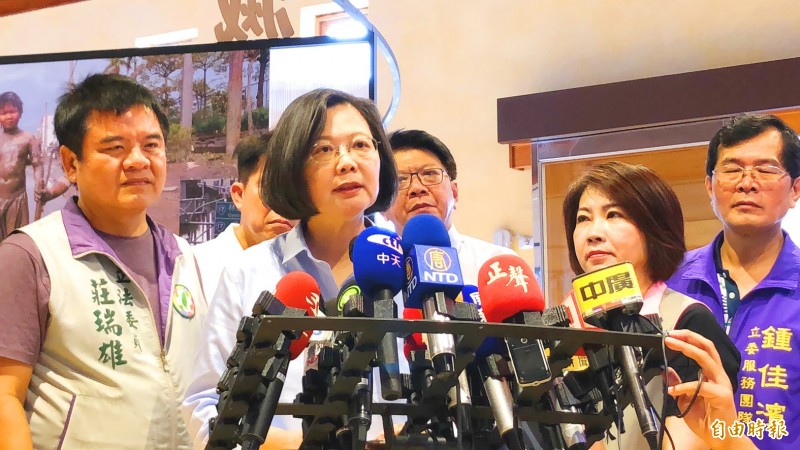《TAIPEI TIMES》 Tsai laments China restrictions

President Tsai Ing-wen, second left, speaks to reporters in Pingtung County yesterday. Photo: Luo Hsin-chen, Taipei Times
REASONING: Beijing believes the protests in Hong Kong could have a negative affect on its push for a ‘one country, two systems’ framework in Taiwan, a professor said
By Chung Li-hua and Sherry Hsiao / Staff reporter, with staff writer and CNA
President Tsai Ing-wen (蔡英文) yesterday expressed regret over China’s recent restrictions on interactions with Taiwanese, saying that it is a “pity” that Chinese people are barred from learning more about Taiwan.
The government has always had a positive and open attitude towards cross-strait interactions, Tsai said in Pingtung County, where she was attending an exhibition commemorating the 10th anniversary of Typhoon Morakot.
The recent restrictions placed on areas such as travel and film are “not what we want to see,” she said.
They take away the opportunity for Chinese people to visit and learn about Taiwan, and to experience its customs, she said.
Beijing on Thursday last week stopped issuing individual travel permits to Taiwan, while China Film News on Wednesday said that the China Film Administration would suspend Chinese films and their personnel from participating in the 56th Golden Horse Film Festival, which runs from Nov. 8 through Nov. 24.
Meanwhile, Hung Chin-fu (洪敬富), a political science professor at National Cheng Kung University, said that the timing of Beijing’s moves could have to do with the celebration of China’s Armed Forces Day on Thursday last week and the annual Beidaihe meeting.
In light of Hong Kong’s protests, the continued trade dispute with the US and the yuan falling to less than seven to the US dollar, Beijing needed to respond to the unease within its society, he said.
The “Taiwan problem” became an “outlet” for it to resolve its internal contradictions, he said.
China’s Hong Kong and Macau Affairs Office and former Hong Kong chief executive Tung Chee-hwa (董建華) have said that the protests in Hong Kong are being encouraged by politicians in the West and the Taiwanese government, said Chen Shih-min (陳世民), an associate professor at National Taiwan University’s department of political science.
Beijing believes the protests would have a negative affect on its push for a “one country, two systems” framework in Taiwan, and as a result, it has suspended a program allowing individual Chinese tourists to Taiwan and boycotted the Golden Horse Awards to “punish Taiwan” and pressure Tsai’s administration, he said.
Based on past experience, its suppression would instead serve to strengthen “Taiwanese consciousness,” Hung said.
Beijing might also target cross-strait flights and the “small three links,” forcing overseas Taiwanese businesspeople and private groups to take a stand close to the Jan. 11 elections, Hung said.
Recently Taiwan’s representative office in Fiji was forced to change its name, and Beijing might continue to poach Taiwan’s diplomatic allies, he said.
The closer it is to the elections, the more Beijing would do to tip the balance to move Taiwan closer to unification, he added.
Chen said that China might also issue military threats against Taiwan, though the use of such threats is highly sensitive and might or might not be effective, which is perhaps why Beijing chose to hold military drills near Dongshan Island and the Zhurihe Training Base about six months before Taiwan’s elections.
新聞來源:TAIPEI TIMES




















